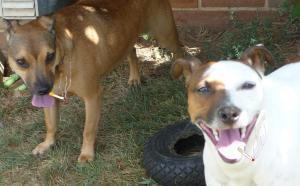Studies Show Second-Hand Smoke Affects Pets, Too
- posted: Jan. 05, 2016

Second-Hand Smoke Can Be Harmful to Pets
It’s a brand new year and many people have made goals to lose weight, to get in shape or perhaps, to quit smoking. While it should come as no surprise, a soon to be published study by the University of Glasgow in Scotland, as well as older studies by Tufts and Colorado State Universities confirm a direct link between certain types of cancer in pets whose owners are smokers.
Cats are especially sensitive to cigarette smoke, possibly due the fact that they practice routine grooming which leads to ingestion of toxins and nicotine from the smoke that adheres to their coats. Researchers found that cats living in smoking households are two to three times more likely than those living in smoke-free homes to develop malignant lymphoma. Studies also suggest an increased incidence of a type of cancer of the mouth called squamous cell carcinoma. While not directly mentioned in these studies, smoke and other particles in the air can also trigger asthma and other respiratory illnesses in cats.
Dogs can be affected, too. Long nosed dogs such as Collies and Greyhounds may have an increased risk of sinus cancer if exposed long term to second-hand smoke, while shorter nosed dogs may have twice the incidence of lung cancer of those living in non-smoking homes. Dogs with long snouts tend to accumulate more carcinogens within the nasal passages while short snouts allow more smoke particles and toxins to directly enter the lungs. Pet birds can also develop lung cancer and pneumonia secondary to chronic smoke inhalation.
Accidental ingestion of cigarettes and other tobacco products can also pose a threat to pets. Eating tobacco can cause nicotine poisoning which can be fatal.
So, if you are a smoker and own pets, especially cats, quitting may improve not only your health, but the health of your pets as well.
This blog brought to you by the Patton Veterinary Hospital, serving Red Lion, York and the surrounding communities.
Information taken from articles on AVMA.org, http://www.gla.ac.uk/news/headline_438291_en.htm (University of Glasgow) and sciencedaily.com.
Location
Patton Veterinary Hospital
425 E Broadway
Red Lion, PA 17356
